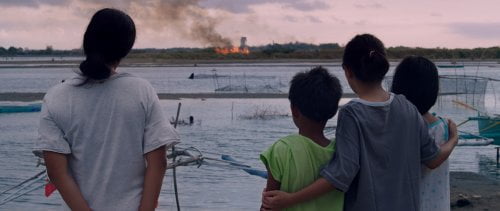Norte, The End of History

On the Filipino island of Luzon, privileged law student Fabian (Sid Lucero) brutally murders a money lender and her daughter, but one of her clients, poor family man Joaquin (Archie Alemania), is pinned with the crime in cowriter (with Rody Vera)/editor/director Lav Diaz epic adaptation of Dostoyevsky's 'Crime and Punishment,' "Norte, The End of History."
Laura's Review: B+
The running time alone - 250 minutes - means this Filipino film will not be for everyone, but it will reward those willing to take the plunge. Diaz has shaped his material with a mesmerizing rhythm, digital lenser Larry Manda's imagery often stunning. The film opens as 3rd year law student Fabian (who stands in not only for Dostoyevsky's central character but Ferdinand Marcos and the upper classes who prey on the poor) propounds on his theory that 'wrong' must be 'destroyed' with some of his professors in a cafe. Calling him an anarchist, Prof. Moira (Moira Lang) argues that there are levels of morality and that his extreme views are barbaric. In a bit of prefiguring, Moira stops to help a woman bleeding on the sidewalk outside as Fabian walks on. We meet Joaquin's family as Aunt Ading (Hazel Orencio) explains to her niece that their pig will be sold and butchered to eat. Joaquin is recovering from a broken leg, an accident that has caused the family to use the capital they had planned to open a restaurant with. His wife, Eliza (Angeli Bayani, the film's heart) is selling off their goods and construction materials to moneylender Madame Magda (Mae Paner) who now essentially owns them. Joaquin's grandfather tells him to be careful, because he's living his second life now. We begin to see the rot beneath Fabian's moral grandstanding. He's conducting an affair with his best friend Kiko's (Lex Marcos) girlfriend. He tries to end it, but she persists, saying they can keep things secret. He takes the first opportunity to out her in front of their entire group, cutting himself off from his friends. That night he witnesses Magda shoving a desperate woman off her doorstep. When Eliza gives up a family heirloom for next to nothing, Joaquin goes to retrieve it and attacks the usurer, but it is Fabian who later murders her and the teenaged daughter who spies him in their house. Joaquin lands in jail for the crime and Eliza contemplates killing her children and herself before clinging to hope (this extended scene, beginning with Eliza telling the dazed Ading to go back home before marching herself and her two children down a long road towards a cliff, is a heartbreaker). At about the halfway mark, Diaz jumps ahead four years. Fabian attempts retribution, showing up at Eliza's meager vegetable stand to give her money, then visits his professors to get them to take Joaquin's case pro bono (they never question why he's so sure the man is innocent, nor do we ever hear anything about their efforts). He visits his sister Hoda (Miles Canapi), an imperious farmer, and denounces his family before going completely off the rails. Meanwhile, Joaquin, who has been making Christmas lanterns for Eliza, finally receives another visit from her. Diaz's ending tableaux are beyond bleak. The film is haunting and haunted itself by Christmas lights and the constant barking of dogs. There are several horrific acts which Diaz intensifies by obscuring his action behind partially open doors or high grass. Manda's observational camera rarely moves, allowing us to live in the scene with Diaz's characters. One magnificent slow pan at dusk moves by the open window of a two story house, the interior glowing out into the night, then passes by to pick up a scooter on the road, slowly following it back.

